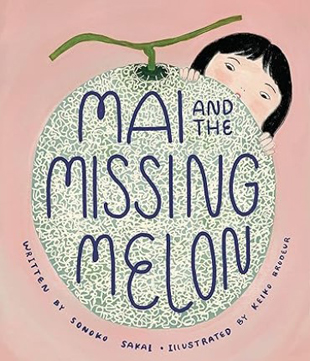Author Sonoko Sakai has worked as a recipe developer, producer, creative director, cooking teacher, lecturer, and grain activist. She moved with her parents from Tokyo to Los Angeles in the early 1970s, where one of her first memories was getting to eat an entire half cantaloupe at a diner. It seemed like a huge splurge, because in Japan melons "are scarce and expensive, often sold in velvet-lined wooden boxes, like jewelry!"
No wonder, then, that when her story's main character, Mai, wakes up one morning and smells the fragrance of a muskmelon that a neighbor gave to her family, she hurries toward the sweet scent. She wants to eat it right away but then has a better idea: to take it to Obachama, her grandmother. Her mother wraps the melon in a furoshiki cloth to make it easier to carry, and off goes Mai on the train.
A kind woman on the train helps Mai put the wrapped melon on the shelf above her seat. It's not until Mai gets to her grandmother's door that she realizes that — gasp! — she left the precious melon on the train.
Not wasting a moment on blame, shame, or reproof, Obachama exclaims, "We must find it!" A great adventure ensues, involving patience, ingenuity, and kindness.
Transformation of a mistake is part of what makes this a wonderful book for three-to-seven-year-old readers. "Even if you can’t change what happened," observes Linda Graham, author of Resilience, "you can shift your relationship to what happened, and that change in your response can enable you to see yourself differently, more resiliently, now." Obachama helps make this transformation possible when she squeezes Mai's hand and tell her, "Don't worry. Otento-sama, the sun, is watching over the melon. No one will steal it when the sun is out."
Three other aspects of Mai and the Missing Melon make it extra special:
- It's like taking a trip to Japan! Sakai's care with detail — from her mention of sun-drying plums to train travelers' bento boxes to the pet crickets in a lost and found — is met in kind with delightfully observant illustrations by Keiko Brodeur.
- There's a story-within-a-story about a hatmaker giving hats to stone Buddha statues, concerned that their heads might be cold.
- Gratitude, reverence, and joy abound, integral to Japanese culture as Mai experiences it.
The book will bring a smile to your face and perhaps evoke laughter, too ... as when at the end, the melon disappears again. This time, it's gone because Mai and Obachama are eating it!
